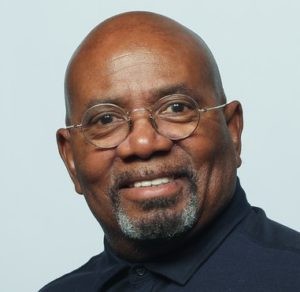As we march into Women’s History Month, I’ve been thinking about women in ministry, particularly Black Baptist women in ministry.
This area is especially near and dear to me as my wife, Betty Wright-Riggins, is a woman in ministry. Betty and I are one of those rare finds — Black Baptist clergy couples. Between us, we have 71 years of combined ministry experience as ordained American Baptist Churches USA clergypersons. I was ordained in 1975 as a then-24-year-old who had just graduated from seminary. Betty was ordained in 1996 following a 25-year career in the public sector.[1]

Aidsand Wright-Riggins
Writing in “The Christian Citizen” in 2019, Charmaine Webster penned these painful words about Black Baptist women in, and aspiring to, ministry:
We’ve been sexually harassed too much. We’ve been overlooked too often. We’ve been encouraged to be first ladies too many times. We’ve had to start too many ministries from scratch to believe there is enough support. We have received too few invitations to one-on-one mentoring sessions and to preach. We’ve witnessed our brothers in the ministry be silent when they should have stood up too regularly. We’ve received too few notices about pastoral openings to believe there is enough support.
Speaking of American Baptist women in ministry in 2015, irrespective of race and ethnicity, the Women in Ministry Task force wrote, “While progress has been made with women now representing 50% of students at ABC seminaries as well as increasing numbers in leadership positions throughout ABC life, women comprise less than 10% of senior or solo pastors, a figure that has not grown significantly over the past several decades.” I am certain that the percentage of Black women in predominantly Black Baptist denominations is far less than the figures that American Baptists recorded in 2015.
My journey versus my wife’s journey
My Black male ministry journey certainly has not been one of gliding smoothly up a crystal escalator. I have my share of stories of setbacks, heartbreaks and headaches over the course of my ministry. But by and large, the trajectory of my ministry career from 1975 to 2015 (when I officially “retired”) was one most would describe as ascendancy. I progressed from being a 24-year-old church planter to being a 34-year-old pastor of an 800-member congregation to being a 40-year-old chief executive of American Baptist Churches’ national domestic mission agency ministering to 1.5 million American Baptists for nearly 25 years.
“I am certain that the percentage of Black women in predominantly Black Baptist denominations is far less than the figures that American Baptists recorded in 2015.”
I often look back and wonder just what these churches and agencies must have been thinking to call a “kid” like me with absolutely no work or life experiences outside of the church to take on such major and daunting responsibilities. Sure, I had the academic credentials and the benefit of having been a “boy” preacher (there were no Black girl preachers when I was licensed to the gospel ministry as a 9-year-old in 1960), but the opportunities I was afforded never were hindered by my gender nor my age.
Even now, 30 years after I was called to serve as the head of the American Baptist Home Mission Societies, I am not aware of any Black female who has held an equivalent post in the Baptist denominational world then or since. I would be delighted to be corrected and to learn otherwise.
Betty, on the other hand, had loads of real-life experiences before going to seminary or stepping into a pulpit. When Betty began seminary, we had children who were older than I was when I first became a pastor. Betty already had earned two master’s degrees and had a stellar career as a speech pathologist, special education teacher, school principal and school district administrator. Besides that, she had 15 years of grassroots experiences in two churches where she took on leadership in youth ministry and Christian education as a layperson.
A visit from concerned deacons
When I was a pastor in South Central Los Angeles in the 1980s, Betty took a class in feminist Christian spirituality under Rosemary Radford Reuther, Mary Daly and Patricia Reif at Immaculate Heart College. At the time, Betty primarily was interested in getting some Christian education beyond Sunday school, and trying to recover from the shock of my having told her that the whale story in the book of Jonah was not factual.
“These men were not at all pleased that Betty was taking a class under these radical women and that her studies had anything to do with feminism or spirituality.”
Upon learning that “Sister Betty” was taking this course, a delegation from the deacon board visited me. These men were not at all pleased that Betty was taking a class under these radical women and that her studies had anything to do with feminism or spirituality. They wanted to know if my house was in order and expressed their bias against having any more women in the church (we had one in seminary) and especially my wife, aspiring to ministry. Betty and I both considered their visit outrageous, as well as the idea that she might be considering ministry. We both felt that one minister in the family already was one too many. Betty entering seminary and ministry was the furthest thing from both of our minds.
Neither Betty nor I knew it at the time, but that course and that moment with the deacons probably was the seed that eventually grew and birthed my call into denominational leadership and Betty’s call to ministry in the local church 10 years later.
A financial sacrifice to serve
Betty has had more opportunities for compensated ministry than most Black Baptist women. In seminary, she took a position as head of a Christian school and soon after that as pastor of a church. Quite Impressive. Unfortunately, Betty had to give up a near-six-figure salary in the secular world to take on the head-of-school position, which paid her only 20 percent of what she had been making.
Within three years of tripling the enrollment of this Christian school for poor Black children run by white evangelical leaders, Betty was fired. She was fired primarily because she did not adequately demonstrate “knowing her place.” Most seminary-trained Black women I know struggle to find ministry positions, and when they do, they often are underpaid, undervalued and overworked.
“Most seminary-trained Black women I know struggle to find ministry positions, and when they do, they often are underpaid, undervalued and overworked.”
Serendipitously, after Betty was fired, she almost immediately was recruited and then called as pastor of a small white Baptist congregation in rural Vermont. These were kind, wonderful and generous people who deeply appreciated “Pastor Betty.” She was made to feel incredibly welcomed in spite of their inability to compensate her anywhere near her worth or her needs. She almost doubled church attendance, extended the church’s reach into the community and became a leader of the local interfaith ministerium.
Financially, it cost us far more for Betty to serve as pastor of the church than she was compensated. For four years, Betty and I lived in two different states and ministered in separate domains. No matter how I traveled every few weeks to see her — by car, plane or train — it took six hours to make the commute between Collegeville, Pa., and Manchester Center, Vt.
The principality of patriarchy
I think Betty could still be serving that church today were it not for the fact that I asked her to give up that position and come home. She loved that congregation, and they loved her. The commute and regularly being snowed in or snowed out for weeks at a time, however, weighed on our relationship and in the raising of our then 16-year-old daughter. I still think I had good reasons to ask Betty to quit. Yet, it is not lost on me that I, as a Black man, would even dare to ask my spouse, a Black woman minister, to resign from a position that in the church world was the pinnacle of the profession — being a solo senior pastor.
I doubt Betty would have asked me to resign from any ministry position I held, for any reason whatsoever. The racial and gender roles and culture we operated under would have precluded that possibility, even if she really thought it the best thing for me/us to do.
In spite of my love and support for my wife, and for being a champion for women in ministry, the “principality of patriarchy” was at work, in my own home, in my relationship with my own wife and in my relationship with my lifelong ministry partner.
“It was not fair for me to use my privilege as a man, as a Black male, and as a Black male minister to ask her to set aside her career aspirations.”
It is not fair. It was not fair for me to use my privilege as a man, as a Black male, and as a Black male minister to ask her to set aside her career aspirations. Nor was it fair that Betty, as an ordained Black female minister, ever had to be in a situation where the opportunities for her to exercise her ministry were only outside her culture, outside her indigenous church community and outside our geographical comfort zone. Yet, this is the case for far too many Black Baptist women.
Moral conviction needed
Currently through New Baptist Covenant’s JusticeReading, we are reviewing Marvin McMickle’s book, Let the Oppressed Go Free: Exploring Theologies of Liberation. He devotes a couple of chapters to the “voices of women” in the church and makes the biblical and common-sense case for deconstructing the evil legacy of sexism and male domination in the church and in society. Especially addressing the Black church, McMickle comments on Galatians 3:28, writing: “There is no way to be against racism and ethnic discrimination but remain in support of sexism and gender discrimination. How can you oppose racism using a biblical text, and uphold sexism using that same text?”
McMickle finally calls for “moral conviction.” I think he is speaking to the Black church and Black male ministers in particular when he writes: “All that remains in the fight against gender discrimination is moral conviction and personal courage to do what one believes to be right, whether or not other persons or other congregations do the same. It is undoubtedly true that discrimination in all its ugly forms continues to exist, because people who know better are still afraid to break away from the status quo and behave differently than their peers.”
I invite you to continue this journey of moral conviction with me.
Aidsand F. Wright-Riggins is a “retired” American Baptist minister, serving as acting executive director of the New Baptist Covenant, mayor of Collegeville, Pa., and executive director emeritus of the American Baptist Home Mission Societies.
Resources suggested by the author for additional learning:
African American Women in the Black Church
Women’s Leadership in the African American Church
Challenging Gender Discrimination in the Church
Women As Pastors? Not All Baptists Say No


